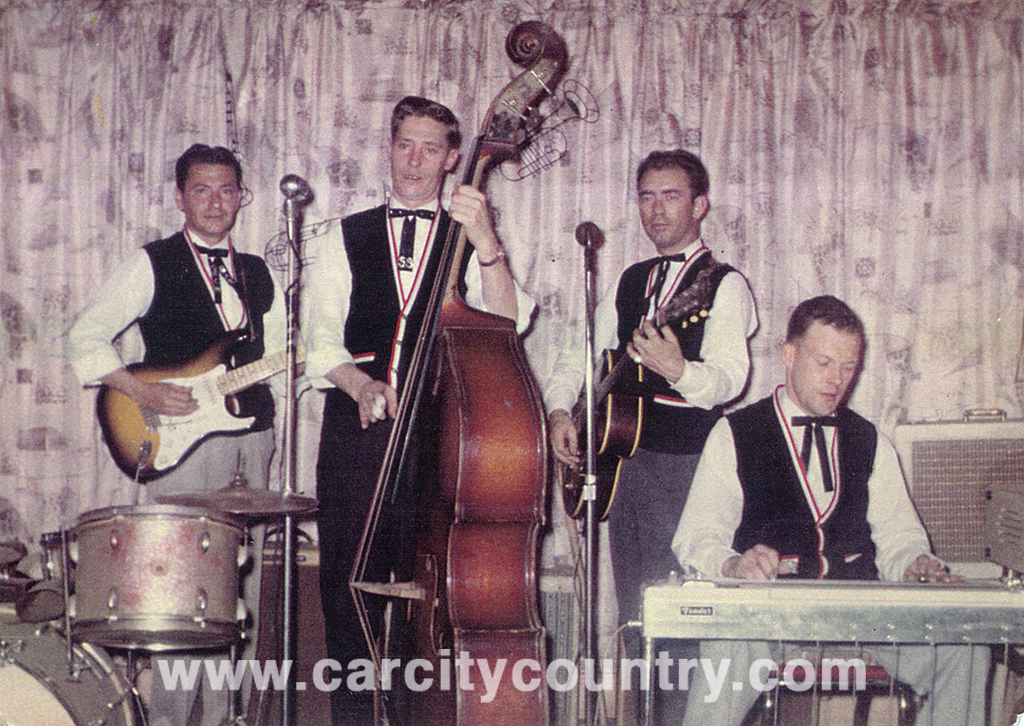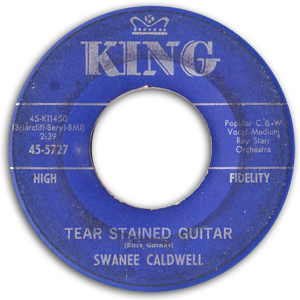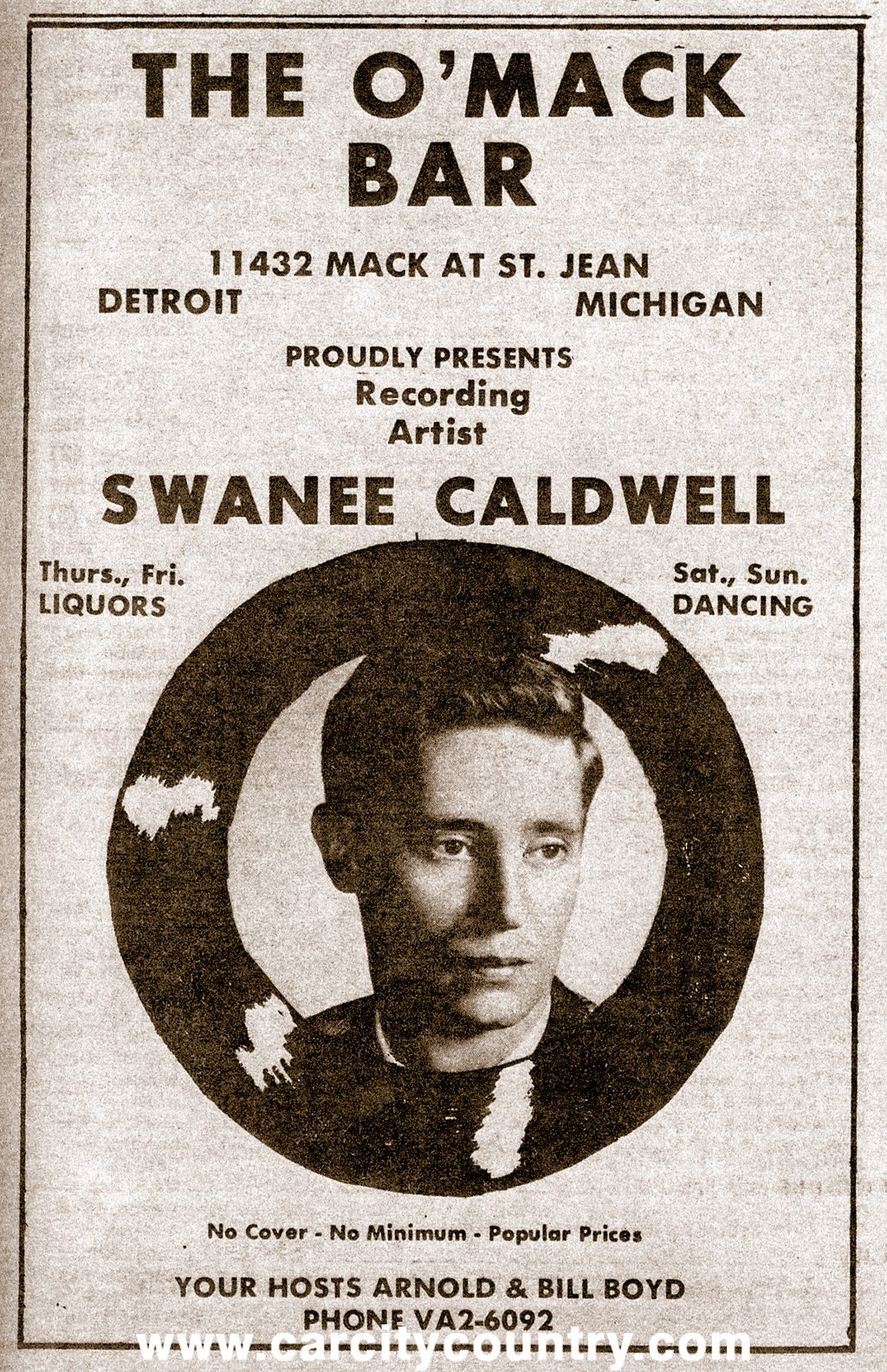An appreciation of Detroit C&W artist Swanee Caldwell, who sang in Detroit clubs through five decades.

Don’t you know Swanee Caldwell
In the spring of 1997, Eddie Jackson and his buddies planned a night out to see his friend Everett “Swanee” Caldwell Jr., a country singer with a few minor hits under his belt, who spent five decades entertaining in Detroit. Caldwell was appearing several nights a week at the Crackerjack lounge on Gratiot Road in Roseville, Michigan. I’d seen Caldwell pick guitar and sing solo at gatherings in Jackson’s home, so I tagged along, excited to hear Caldwell perform with a full band.

We entered the lounge single file. The place was packed. “Hello, Craig.” I looked toward the stage as I heard Caldwell’s voice over the speakers, and he gave me a smile when he caught my eye. All night long he greeted customers who walked through the entrance – many by name, and he invited musicians in the crowd to sit in with the band.
With Marv Weyer playing lead guitar, I sang Elvis Presley’s “I’m Left, You’re Right, She’s Gone.” “Do another one,” said Caldwell from a table in front of the stage. We played “Let The Teardrops Fall,” originally cut by T. Texas Tyler and Patsy Cline, while Caldwell mingled with his audience, which included many regulars who followed him from gig to gig through the years. As he returned to the stage, Caldwell was kind enough to compare me to himself when he was in his twenties.
West ‘by God’ Virginia
He was born in “Logan, West – by God – Virginia.” [1] Publicity from the 1960s stated January 6, 1935, as his date of birth. [2] However, his obituary in the Detroit Free Press said he was 71 years old, which pegged the year 1929. [3] Biographies said he arrived in Detroit around 1952. To avoid working in the coal mines near Logan, Caldwell served overseas in the army after high school. [4]

In Detroit, Caldwell hired into factories, while getting noticed in nightclubs by playing bass (first upright, then electric) and singing with a variety of country musicians. Eventually he worked at the Ford plant in Wixom by day, and led a group called the “Rock-A-Billies” in Detroit bars at night. His nickname came from a habit of singing Stephen Foster’s “Old Folks At Home” (a.k.a. “Swanee River”) to warm up his voice.
In 1959 and 1960, guitarist Al Allen recorded Caldwell’s first records in the basement of his home. The Clix label, of Troy, Michigan, issued two singles. The Happy Hearts Record Company, based in Wayne, pressed his next single around 1961. Caldwell described these early efforts as having a “Bill Haley rock beat.” However, he excelled with the slow numbers. Caldwell sold these records mainly in local clubs and jamborees where he entertained.
Listen to: Tear Stained Guitar – Swanee Caldwell
Caldwell’s recorded output and notoriety soared during the 1960s, as he cut music for eight other labels: New Star (1962, also issued on Bethlehem), King (1963-64), Sims (1964), Rich (1965), Boone (1966), Evers (ca. 1967), and Caravan (1967, Eddie Jackson’s label). His sides for King were cut in Cincinnati, Ohio, and included the Hometowners, WLW radio staff musicians and singers. Caldwell’s versions of “Tear Stained Guitar” and “Six Days On The Road” sold fairly well on King. One local favorite from his King sessions was “Don’t You Know,” a remake of a song introduced in 1958 by the Lucky Lee Trio (on Fox). Dave Larsh, who played guitar in the trio, also gigged with Caldwell for several years.

Swanee Caldwell appeared on TV and radio around Southeast Michigan and Southwest Ontario, as well as on “Grand Ole Opry” shows touring the region. He visited the annual disk jockey conventions in Nashville, Tennessee, where he cut his music after leaving King Records.
Fast horses, fast friends
He continued working in the factory and headlining in Detroit bars during the 1970s and 1980s, often inviting Eddie Jackson to share the stage with him. Country radio disk jockey Deano Day broadcast many nights from Caldwell’s venues such as the 3-Star on 8 Mile Road. Beyond these activities, he found time to invest in racehorses.
After retiring from Ford in 1985, Caldwell increased his performance schedule to three or more nights a week, presenting crowds with a tasteful mix of current country radio hits and classic favorites. Although Caldwell wasn’t a songwriter, his popularity resulted from his expert vocals, friendly personality and humor, and professional bands.
In 1999, Caldwell said “so long” to his fans and left the clubs. He passed away February 26, 2000. Caldwell’s visitation a few days later inspired what seemed like a grand reunion of Detroit musicians and country music radio personalities, and I ran into my friend, disk jockey Keith Cady (Keith Jason on WSDS Ypsilanti). He couldn’t get over all the stories floating around the room. “We need to document this, before too many others go the way Swanee has,” he said.
“Buddy, I have been kicking myself for not recording an interview with Swanee,” I replied. At the time, I hosted a show on public radio in Detroit. “I’ve thought about writing a book,” I said. “We should collaborate and see what we come up with.”
Click here to see what we came up with.
********************************************
Notes
- Swanee Caldwell conversations with Craig Maki, 1995-98.
- “Walled Lake Men’s Club of Michigan Christian College presents Big Country Music Show” Souvenir program (Nov. 28, 1964) Self-published: Walled Lake, Michigan.
- “Everett (Swanee) Caldwell” Obituary in the Detroit Free Press (Feb. 29, 2000)
- Paul Wade. “Southern As The Name Implys [sic] – Swanee Caldwell” Music City News – Michigan Supplement (Feb. 1967. Vol. 2, No. 2) 1, 4.


7 Comments. Leave new
I remember him very well . I went on to have a career in clubs and on the road playing and singing country music and always remembered his and others influence in my music .
My first paying gig as a drummer I was 14 years old, it was with Swanee. I went on to play with Swanee on and off until the year he died. I will always be grateful for his genuine like for me as a person and a young musician. I remember that first gig with him, the first time he heard me play. I don’t remember the song but I remember I was playing brushsticks. He turned around 8 bars in and stopped singing to ask me….how does a 14 year old young man know how to play brushes.
We finished that set, he came up to me…I will never forget his words. Son he said, as long as I have a gig you have a job playing drums for me.
I only wish I could play with himm one last time. That voice he had, I can still hear it in my head every time I think of him, which I do often. Every time I hear Ray Price, it reminds me of my old friend Swanee.
I miss you Swanee 🙂
Great story, Jim. That sounds just like the way I remember him. He was a generous soul.
One of my favorite Uncles. As children, when we would go to West Virginia and visit my great grandmother, and he would be visiting too, he would gather us kids around and sing to us. We sure did love hearing him sing. He was a loving and caring uncle from a big family who loved him dearly and we cherish the wonderful memories we have with him.
Around 1969/70 my group of friends would go to the Caravan. Gardens to hear Swanee sing. Us girls had such a crush on him
My brother in law, Jerry Tittle, told me that when his band “the Cadillac Cowboys” wasn’t playin at Filthy J McNasty’s, he would often look up Swanee wherever he was playing, usually the 3-Star or Chester’s, and play a set or two.
Yeah, I recall even during his last nights of playing for the public, Swanee often had guest musicians join him on stage. I heard some wild stories about him and Eddie Jackson swapping sets at the 3-Star during the 1970s. He surrounded himself with the best musicians.